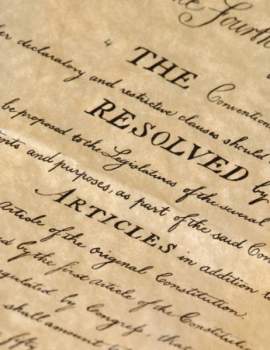
Understanding Constitutional Review

Popular In Constitution
Purpose Of Lifetime Appointment And Pros And Cons Enumerated Powers Bicameral Legislature Background Article 3 Of The Constitution We The People 1st Amendment Who Wrote The Constitution Judicial Review Equal Protection Clause 5th Amendment 10th Amendment Three Fifths Compromise
Following the landmark case of Marbury v. Madison, judicial review became an intricate and significant part of the Federal judiciary system. As a member of the Federal judiciary, the Supreme Court now maintains the authority and power over the judging of cases under the express interpretation and explicit guidance of the United States Constitution. Such a judicial review has enabled the viability of all aspects of law to be accountable if deemed unconstitutional.
Judicial review abides completely in accordance to the Constitution as the "supreme law of the land." In such a way the Federal judiciary must ensure that no State or Federal law be in any violation of it. Despite its advent in the Supreme Court, judicial review has also been instituted in various other Federal courts as well as State courts.
In general, despite the unconstitutionality of a law or statute, a court may not possess the power of judiciary review without the existence of some type of case being pursued or controversy concerning it. In such a way, at least one side must be present with the position of legality in order to continue with such a lawsuit. So as to bypass cases, which could easily be judged in reference to areas other than that of the constitution, the Supreme Court came up with a number of rules or guidelines by which judicial reviews according to the Constitution may be enacted.
Cases that concern friendly suits may not seek out the Constitution for judgment. There is no need for such actions, as the non-adversarial nature of such a case may be handled by other means. The Court may also not assume questions of constitutionality prior to a pressing need being observed. Jumping towards such hasty actions present unnecessary uses of judicial review. In addition, the Court must not extend a rule concerning Constitutional law without the existence of equally distinct facts for which it may be adequately applied. If presented with two ways to approach a case, such as that of the Constitution versus the statutory law, the Court will always be expected to employ the latter as its basis for judgment.
In addition, when statutes are at question, courts must first render the structure of the statute as viable and lawful prior to taking any action toward judicial review in connection to the United States Constitution. This allows for such an action to be avoided until absolutely necessary.
A representation of the exercising of such rules is that which is exemplified by the amount of time that passed between the case of Marbury v. Madison and the next Constitutional reviewed case. It was not for about 50 years until another such case was heard in such accordance.
Judicial review allows for the Federal judiciary to exercise its authority in accordance with what is set forth by the Government, and therefore, goes forward with its interpretation according to various jurisdictions on its way to adequate rulings.
NEXT: What Is The Scope of Federal Judicial Power





















